Which Is The Best Juicer To Buy?
And Which Type Really Suits You?

A rather simple question which has a slightly complicated answer. Selecting the right type of juicer is absolutely paramount to the results you want to achieve from a juicing, whether it is weight loss, detox, beauty or long term health — the right juicer makes all the difference.
Which juicer to buy depends on the type of juice being made and a budget, let’s first learn about the type of juicers that exist; and with this knowledge in mind, choosing the best juicer (for your needs) to buy should be a snap.
1. Citrus Juicers
Citrus juicer exist to make quick work of oranges, lemon, grapefruit, lime and tangerines. They come in very cheap non-electrical versions, and slightly more expensive motorized version which run off electricity.
I personally prefer electric/motorized citrus juicers, because they are quick, efficient and do a far more thorough job of squeezing every last drop of juice, which you could also do, if the aid of a motorized hand was available.
- Pros of Citrus Juicers
- Amazing for Citrus Fruits
- Relatively cheap
- Fast
- Cons of Citrus Juicers
- Only Juices Citrus
2. Centrifugal Juicers
Centrifugal juicer are relatively cheap, fast and abundantly available. They’re great for a quick juice and are [perfectly suitable for fruits and chunky vegetable juicing. They’re however, not my first recommendation for more serious juicing and a definitely should be avoided by serious vegetable juicers.
Centrifugal juicers feature a rotating blade that cuts up fruits, then attempts to press the juice out. Unfortunately, this process involves heat, which dries up the nutrients of certain fruits. Also, you can’t really make a leafy detox or berry based juice very well.
So why buy a centrifugal juicer? Well, the juice that does come out of it is perfect for cooking, it’s also very smooth and it’s the cheapest option for an all-in-one type juicer, unlike the highly specialized citrus juicer.
So why buy a centrifugal juicer? Well, the juice that does come out of it is perfect for cooking, it’s also very smooth and it’s the cheapest option for an all-in-one type juicer, unlike the highly specialized citrus juicer.
- Pros of Centrifugal Juicers
- Fast
- Cheap
- Great for Cooking
- Smooth Juices
- Cons of Centrifugal Juicers
- Fruits Lose Nutrients
- Loud
- Not Ideal For Leafy Greens
- No Nuts, Almond or Cashew Milking
- Produces Heat
3. Cold Press Juicers
My final and third type of juicer is the cold press juicer, which as the name suggests, works by pressing the juices out of fruits, greens and nuts without adding heat to the equation. Generally considered a better option for pure juicing, the cold press variety also tends to command a higher price tag than its cheaper centrifugal cousin.
Also known as masticating juicers, they produce a very high yield across all types of fruits, vegetables, leafs greens and nuts. Making virtually no noise and retaining nutrients beautifully, a cold press juicer should be at the top of any serious juicer’s list.
However, a masticating juicer produces a lot more pulp compared to our previous two contenders, and less smooth juice compared to a centrifugal juicer. This may be a pro or con — depending on personal preferences when it comes to juice pulp and smoothness.
- Pros of Cold Press Juicers
- Retains nutrients
- Juices Berries, Fruits, Nuts and Leafy Greens
- No Heat While Juicing
- Cons of Cold Press Juicers
- Expensive
- Rough Juice
- High Pulp Extracts
So, which is the best juicer for you? Well, If you’re into freshly squeezed juices a cold press is my recommendation.
If you’re on a shorter budget, then centrifugal juicers works just fine (depending on what’s being juiced) and citrus juicers are the best and only choice for people who enjoy a glass of freshly squeezed orange juice in the morning.

